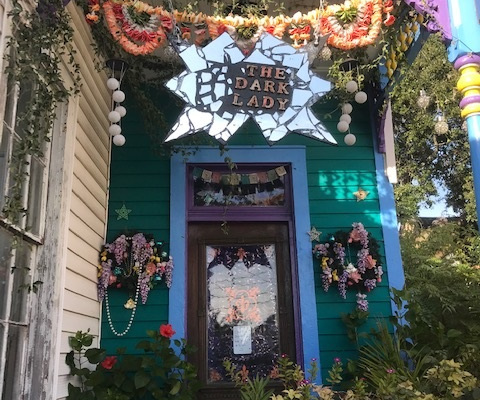
Voodoo in New Orleans. (Photo by: Krewe Magazine)
Editor’s Note: The following series “Via Voodoo Vie: an Exploration of Voodoo in NOLA” is a week-long series curated by Emily O’Connell as a part of the Digital Research Internship Program in partnership with ViaNolaVie. The DRI Program is a Newcomb Institute technology initiative for undergraduate students combining technology skillsets, feminist leadership, and the digital humanities.
The history and tradition of Louisiana Voodoo has become a unique part of the culture of New Orleans. However, it goes deeper than the Voodoo that has been popularized by the media and tourist attractions. With origins in West Africa and Haiti, brought to Louisiana by enslaved and freed people of color, Voodoo has a rich and often overlooked history, so let’s explore how Voodoo has made its mark on the city and how the city has, in turn, influenced the perception of Voodoo. Continue reading to learn more about the past and present of New Orleans Voodoo and its relationship with Haitian Voodoo. Originally published on February 4, 2020.
Voodoo has, for years, been depicted with scary dolls, zombies, and black magic rituals. If a traveler comes to New Orleans, it becomes a fun gimmick for tourists. But really, voodoo isn’t satanic and isn’t a tourist attraction. The religion that is voodoo derives from a number of spiritual beliefs from a number of African people, mainly coming from Benin. Traditionally spelled Vodou, this religion came to Haiti from west Africa, primarily Benin, but also parts of the Congo and Yoruba land.
It can be argued that Voodoo is a huge part of New Orleans culture. However, that claim is perhaps questionable. Bozanfe Bon Oungan, a Voodoo practitioner and shop keeper of the ‘Dark Lady’ on Magazine St. argues that New Orleans Voodoo is not the same as Haitian Voodoo. He begins by pointing out that when people were fleeing the Haitian revolution, Louisiana, which was under Spanish rule at the start of the revolution, would have turned away the ships carrying Haitian immigrants. The article, Haitian Immigration : Eighteenth and Nineteenth Centuries backs this claim by stating that the revolution was from 1791 to 1804, whereas Louisiana was governed by Spain, France, then the U.S., and that all of those governments would have turned away Haitian refugees because the fear of slave-revolts was very high.
However, the article also mentions that despite these governments prohibiting Haitian refugees, especially free men of color, the immigrants still came and bolstered the population of Louisiana.
Bozanfe Bon Ougan mentions, “Based on what had happened in Haiti, [1915-1934] the newspapers here throw around the “V” word at an actual African cultural survival that had nothing to do with us.” Meaning that most of the spiritual practices in New Orleans at that time did not self-identify as Voodoo. Obviously there would have been similarities, especially since Haiti and Louisiana were both French colonies and would have had enslaved people from around the same area. However, “It’s not Haitian at all. It never was at all, but the newspaper says the V word, the V word sticks ….” (Bozanfe Bon Ougan). The African religions were not very well understood and suppressed, especially during the Jim Crow years. Bozanfe Bon Ougan says that a good source to use to understand what was happening in New Orleans during that time is the writings of Zora Neale Hurston.
So, after many years of suppression and mis-information, Voodoo starts to become something people sell. In many cases, people read a book about Voodoo and claim that they can do spiritual work for people. That is just not how Voodoo works. One must have the rituals done and the training learned to be qualified as legitimate. “I think that the majority of the people that are practicing under the V-word in New Orleans have no connection to African spirituality other than they think that they can read a book which lets them light a candle and they can charge someone money for that.” says Bozanfe Bon Ougan. Another point he makes is that religion is communal, and most people in New Orleans don’t have gatherings or parties for their spirits. No, Voodoo Fest does not count.
 NOLAbeings Multimedia artist Claire Bangser created NOLAbeings as a portrait-based story project that marries...
NOLAbeings Multimedia artist Claire Bangser created NOLAbeings as a portrait-based story project that marries...  Voodoo in New Orleans: Reviving history: New Orleans fortune telling This article takes a deep dive into the history of Voodoo in New Orleans, its hybridization with Catholicism, and its present-day place in the city's culture. The author visits fortune-tellers in the French Quarter, using their guidance as a tool for introspection rather than a deterministic predictor of the future. Through her experiences in New Orleans, the author feels a mystical connection to both the past and the future.
Voodoo in New Orleans: Reviving history: New Orleans fortune telling This article takes a deep dive into the history of Voodoo in New Orleans, its hybridization with Catholicism, and its present-day place in the city's culture. The author visits fortune-tellers in the French Quarter, using their guidance as a tool for introspection rather than a deterministic predictor of the future. Through her experiences in New Orleans, the author feels a mystical connection to both the past and the future. 